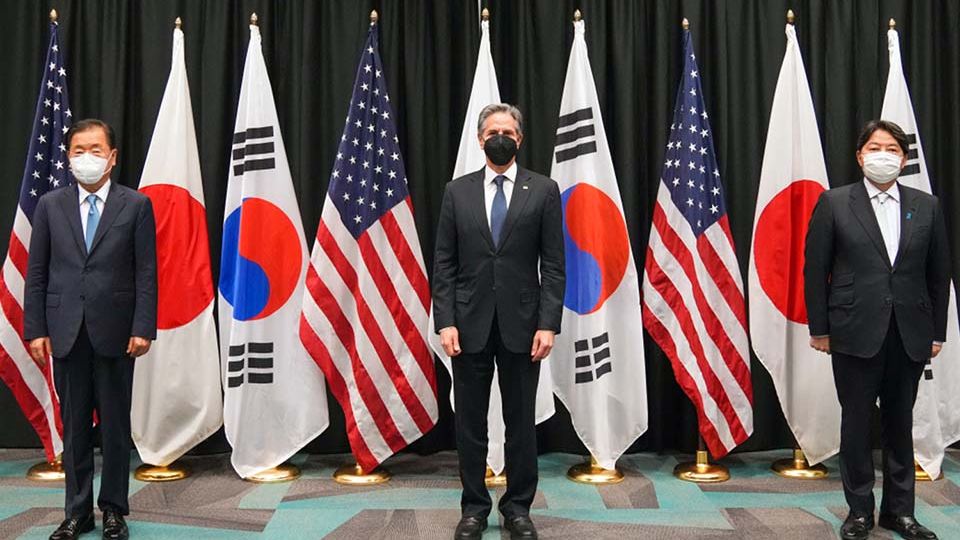August 20, 2024
SEOUL – The leaders of South Korea, the United States and Japan on Sunday issued a joint statement praising the achievements of their cooperation since their historic Camp David summit a year ago and vowed to bolster it.
In August last year, South Korean President Yoon Suk Yeol, US President Joe Biden and Japanese Prime Minister Fumio Kishida held their summit at the US presidential retreat, where they adopted the Camp David Principles, a comprehensive framework for guiding trilateral cooperation.
Their joint statement to mark the first anniversary of the summit emphasized the indispensability of their cooperation for meeting today’s challenges. It also stated their commitment to keep cooperating without wavering, despite leadership changes expected in the US and Japan.
After the Camp David summit, the situation on the Korean Peninsula remains unstable.
North Korea and Russia are strengthening their military cooperation to the extent of a practical bilateral alliance. Pyongyang has unceasingly provoked and threatened Seoul directly, flying rubbish-laden balloons into South Korea.
The North is expected to carry out more shocking provocations, such as conducting an atomic bomb test and launching an intercontinental ballistic missile over Japan in October, ahead of the US presidential election in November.
It is meaningful for the leaders of the three countries to reaffirm the necessity of strengthening their cooperation at a time when the situation on the Korean Peninsula must be kept stable.
The three countries have made progress across a broad range of areas since the summit.
Tighter cooperation in security is the most prominent. Among other milestones in the achievements of their cooperation are the execution of the first-ever trilateral multidomain exercise Freedom Edge and the signing of a new Trilateral Security Cooperation Framework by defense chiefs. Conspicuous progress was made as well in combating North Korea’s efforts to fund its weapons of mass destruction programs through cybercrime and other illicit means. Cooperation and communication were also smooth in the areas of economic security, high technology and supply networks.
However, the three countries face demanding challenges in keeping up their trilateral cooperation.
Both Biden and Kishida have announced their decisions not to seek reelection in the US presidential election in November and the September election for the leader of Japan’s ruling Liberal Democratic Party, which will determine the next prime minister.
It has become a problem in hand to maintain a close trilateral cooperation regardless of expected changes of government in the US and Japan. Seoul must brace for various political scenarios in Washington and Tokyo.
The decisive driver behind the Camp David summit was Biden’s foreign policy that sets much value on alliance. A change in leadership in the US will inevitably influence the future of the three-country cooperation.
It is impossible to predict who will win the US presidential election in November.
If the Republican presidential candidate, former President Donald Trump, regains power, the Korea-US alliance will likely sail on rough seas. The possibility of the trilateral cooperation being shaken cannot be excluded. Be that as it may, it is difficult to predict if the Democratic presidential candidate, Vice President Kamala Harris, will extend Biden’s policy or differentiate her foreign policy.
Tokyo’s approach to historical issues involving Korea is regarded as a weak link in the chain of trilateral cooperation, considering that the country still lacks sincerity on historic issues in the eyes of many Koreans.
Seoul should try to prevent historical issues from negatively affecting Korea-Japan ties. If Korea-Japan relations are strained, trilateral cooperation cannot work normally, no matter how hard the US president emphasizes it.
One effective way to keep up trilateral cooperation is to continue to expand the areas of common interests. To do so, it is necessary to formalize their cooperation in writing and hold working consultations more frequently.
When it comes to reducing security concerns on the Korean Peninsula, the Korean government must play more active roles in solidifying its cooperation with the US and Japan.


